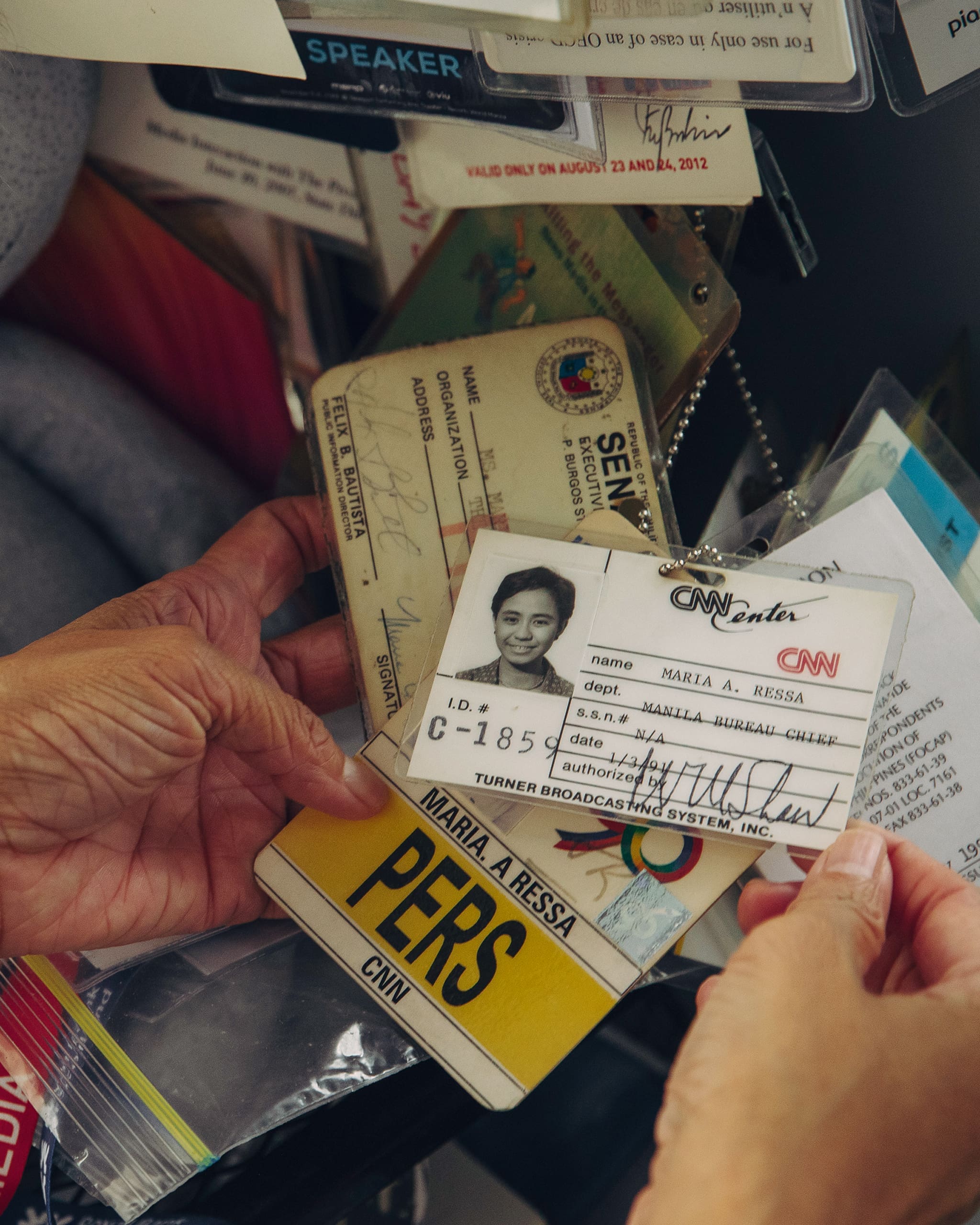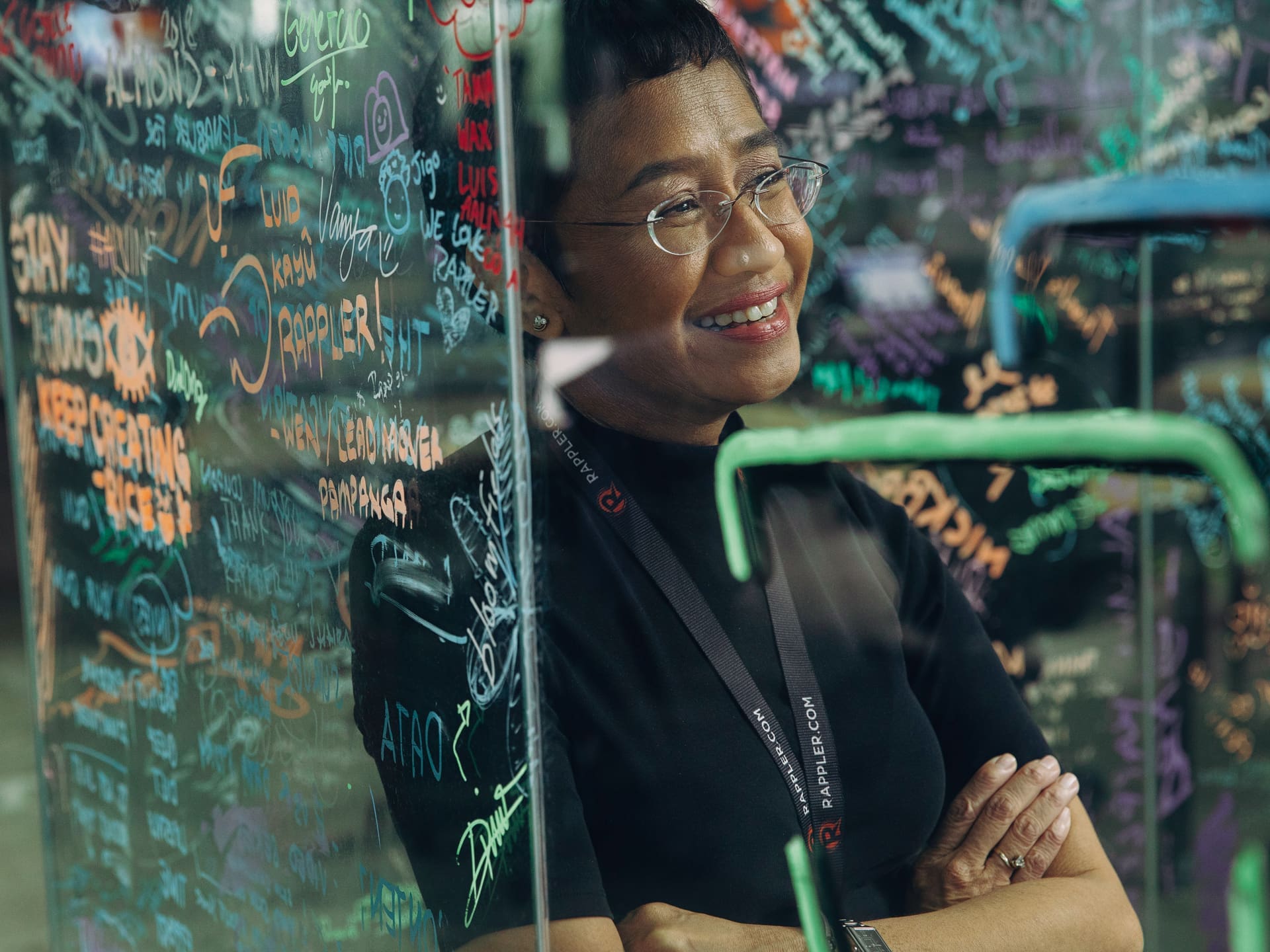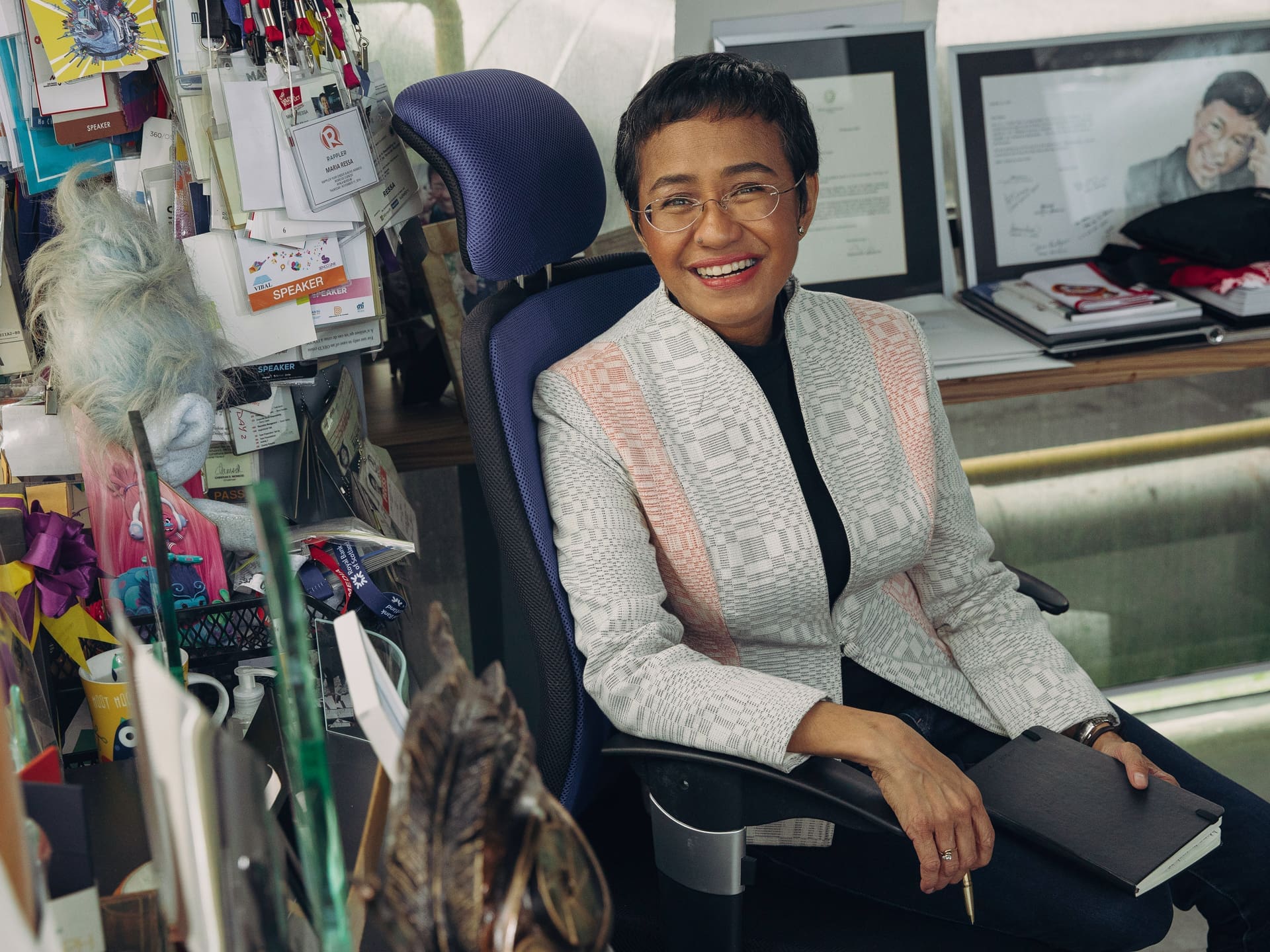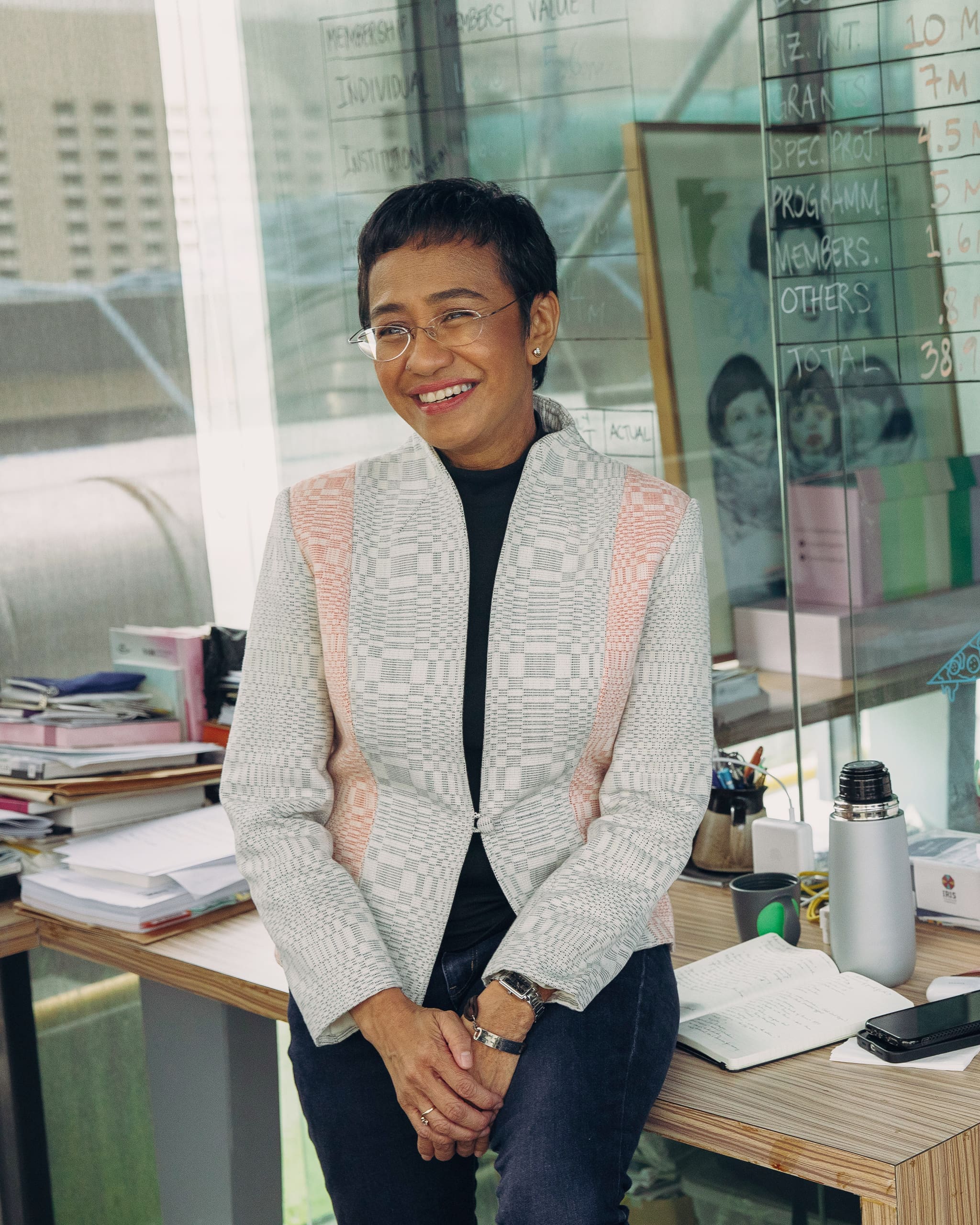Photograph by Joseph Pascual
The Rappler CEO says she feels like “Cassandra and Sisyphus combined,” but has not wavered in the face of imprisonment or in her desire to restore humanity to our social networks.
Maria Ressa is being trailed around the Rappler headquarters by a film crew shooting a short day-in-the-life documentary of the first Filipino Nobel Laureate and widely admired figure in the global fight against fake news.
So far, it’s been meetings after meetings, including this Vogue Philippines interview in the middle of the day, and possibly a watch party in the afternoon as President Ferdinand Marcos Jr delivers his first State of the Nation Address. The video will be shown at the Clooney Foundation for Justice’s inaugural Albie Awards in September, where Maria will receive the Justice for Journalists honor—if she’ll be allowed to travel to New York, that is. The Albie Awards was formed, as Amal and George have explained, to put the focus on and effectively protect “people who are in jeopardy of going to jail or being killed.”
With the recent Court of Appeals decision to uphold Ressa’s cyberlibel conviction and the SEC affirmation to shut down the digital news organization she co-founded ten years ago, anything can happen. “That’s why our lawyers are here. We could get raided!” she says with a smile.
There is no inkling of being on edge, at least not to this outsider. Ressa offers coffee, hugs to colleagues she hasn’t seen in a while, and is still very much her supernice, obliging self. Her cheeriness in the face of existential threats has almost become a trademark, remarked on by mystified commentators and admiring friends alike.
Ramona Diaz, whose film A Thousand Cuts tensely tracks Rappler’s ordeals against the backdrop of the 2019 midterm elections, attributes Maria’s show of fortitude to her being a quintessential journalist. At one of the courtroom hearings, the director observed Maria constantly writing in her notebook even as she and Rappler were being discussed. “That’s almost like her shield. It takes her out of the situation and makes her an observer rather than a participant,” Diaz says, “and that’s how, I think, she keeps her calm and clarity, and how after being convicted of cyberlibel, she’s able to hold a presser and be very clear on what she wants to say.”
And Ressa says her piece often and eloquently, at various international lectures on press freedom and even at her alma mater in Toms River, New Jersey, when her high school named its auditorium after her. It’s a speech whose narrative arc reaches a nadir when technology—specifically social media—becomes weaponized to condition humans to be their worst selves, tearing societies apart and fracturing democracy itself.
It might sound like a scenario out of science fiction, which Ressa admits to being a fan of, but in this world, it is actually happening. The journalist has been studying network systems since her CNN days reporting on the Al-Qaeda links in Southeast Asia, and has personally been a target of malicious, malevolent trolling over the past six years. Last December in Oslo she delivered her Nobel Lecture, her most imploring and heartfelt speech yet, where she asked the audience—the whole world—to imagine a world of peace, trust, and empathy.
Maria is not only imagining it, she’s actively working to create it, pushing for legislation that will put guardrails on tech platforms, continuing Rappler’s work as journalists who hold the line, and rebuilding community through multi-sectoral campaigns that combat disinformation.
“We keep going because we have no choice,” she says, this time with a laugh. “What are we going to do? Give up?”

This interview has been edited for length and clarity.
What are you expecting from the upcoming SONA in a few hours? Maria Ressa: I’m keeping a very open mind. I have no idea what to expect, you know, because the world is upside down.
We’re in the upside down. We’re in the upside down. It’s interesting because some of our folks said that the President’s inauguration speech made sense. Well, that’s really different from the last six years. You don’t have non sequiturs, and there’s actually a point. So in some ways the bar is so low that it can only be better.
Is there a possibility that something like January 6 could happen here? The Ateneo shooter could be a harbinger of what can happen if a large enough group was incited. I don’t want to be alarmist, but when you’re in the upside down anything is possible, right? I would never have thought that I’d have 10 arrest warrants or that I’d be facing the rest of my life in jail. If you had asked me that a decade ago, I was like, that’s ridiculous. Now look at where we are. The Ateneo shooter was extremely violent online. It validates our data and what I’ve written in the Nobel lecture— online violence is real world violence, impunity online leads to impunity offline. These are not separate worlds.
We have been pumped full of anger and hate and disinformation that lead people to take action. It’s been proven in so many countries around the world. I don’t think we’re immune to that. This is part of the reason, in the Nobel lecture, I said that social media has become a behavior modification system. So I’m hoping there’s some mitigation through the Digital Services Act and the Digital Markets Act in the EU, which will kick in over spring next year.
How will these Digital Acts affect the online platforms? The DSA and the DMA will demand greater transparency. It’s similar to how Apple’s new privacy features impact Facebook’s bottom line. It’s not only losing revenue, it lost some influence in terms of micro targeting. What these platforms have done is essentially clone us. And then based on our atomized posts, it uses machine learning to create a model of who we are. So it owns our personal thoughts and using AI, they can actually micro target each of us. Shoshana Zuboff [author of The Age of Surveillance Capitalism] has said that markets that trade in human futures should be made illegal, like the slave trade was made illegal.
And it’s not just Facebook, a lot of Gen Z are getting radicalized on TikTok. It’s all interconnected. But you’re talking about 36 to 39 million Filipinos on TikTok. You’re talking 80 million, 81 million on Facebook. And then YouTube is now number one over Facebook. This is the information ecosystem. It’s why an Atom Bomb has exploded. And the biggest casualty is not just us individually—it is trust. You don’t know who to trust, and that plays to the hands of power.
What actions could fix this? Tristan Harris of The Social Dilemma suggested reducing virality on social media. That’s part of what the Digital Services Act and Digital Markets Act are doing, by attacking algorithmic amplification. I’ve testified in every country that has legislation coming up in the EU. In the US, I had asked to reform or revoke Section 230 of the 1996 Communications Decency Act, which pretends that these platforms are just pipelines, like a telephone, right? But the telephone doesn’t decide what calls you make. It just allows the calls to come through. Well, these platforms decide what you see and then use this very harmful feedback loop to get more of your data, to sell.
How do you know which content is going to get the greatest amplification? In the past, if you were a television broadcaster, you were dually responsible for both content creation and distribution. Now the platforms are distributing the most incendiary content that keeps you scrolling—lies laced with anger and hate. A 2018 MIT study that showed that lies are more prone to get retweeted. You are six times more prone to share lies over boring truth. This is why we’re in the upside down.
Rappler also works with Meta/Facebook on fact-checking campaigns. Was this collaboration a result of your investigation or calling out Mark Zuckerberg? We’ve actually been alpha partners with Facebook from the beginning. If Facebook search had worked better in 2011, we might have never started Rappler. Facebook asked us to become fact-checking partners in 2018 and we did it because once we find the lie, we have the data for the information ecosystem in the Philippines. I can then track the networks that are spreading the lies. So that allows us to have really robust research into disinformation. And it’s scary.
Has Zuckerberg done anything else to address this? No, he fled to the metaverse. And I don’t understand what would make him think he can make the metaverse any better than what he destroyed. Anyway, I will shut up. I try not to say anything if I don’t have anything good to say. (Laughs)

Rappler and other news organizations depend on social media to spread their content. If virality or amplification is decreased, won’t that affect audience growth? You need to change the ecosystem. We’re building our own platform called Lighthouse which we’ve been working on since 2020. I had hired a Silicon Valley CTO, but the money I had set aside to build it was used for legal fees, those lawyers. We’ve had to build it very slowly. So we lost years and we need to validate that the idea still works. Where can you have fact-based, evidence-based conversations in real time and where you can bounce ideas? That’s what we’re trying to create.
That’s one way. But the other part is that virality is like mob rule. If you’re not distinguishing fact from fiction, lies from incendiary hate, then you’re poisoning the public sphere.
Going back to Rappler’s origins, all the founders are women journalists. Was there a deliberate vision to have a women-led organization? No, not by design. What I did was the founders, they were the best. What did we want? Independence. And I wanted to explore the new technology. I wanted to take the knowledge we already had from running ABS-CBN, the largest news operation in the Philippines, and embrace the technology. It was the four of us—Glenda [Gloria] was running ANC, Chay [Hofileña] was doing standards and ethics workshops for ABS-CBN, and Beth [Frondoso] was in charge of all the newscasts.
And that was a tough thing— like social media, we could just feed you lots of sugar. If you do crime and entertainment, you get the highest ratings, but we handcuffed ourselves. You gotta give the vegetables with the sugar. It’s not ratings above all. When journalists are the ones running, making those standards and ethics calls, you try to find what is good for the public sphere.
How did you use data to drive the growth of Rappler? I did social network analysis. Before I left CNN, I wrote a book on Al-Qaeda’s partners in Southeast Asia. I tracked terrorists using social network analysis. Jamaah Islamiyah and how it hijacked homegrown movements in the Philippines, and what we saw was this virulent ideology that spread faster online. But what happened was that I started thinking, if the bad guys can do this and convince someone to be a suicide bomber, why can’t we use these same networks to spread good?
That was the idea behind Rappler, social media for social good. I still think it’s there. We’ve done a lot of good. Here’s the upside— this is a period of creation. The challenge is, Filipinos and every other country with a democracy need to actually reimagine and create civic engagement in the age of social media. That means you can’t just sit back and let the information come to you. That means you have to get out. You have to organize. You have to take care of your area of influence.
And you’re still optimistic! It must get better. What happened after the atom bomb exploded? The world didn’t destroy itself. After World War II, they came to the brink. They were so shocked by the atom bomb and that it was the United States that dropped it. It created all sorts of global institutions and pacts like the Universal Declaration of Human Rights. We’re living through another moment like that. What are we going to do? I think that’s the challenge and that’s why I’m still hopeful. I like challenges. (Smiles)

A version of this article appeared in the Vogue Philippines September 2022 issue.
